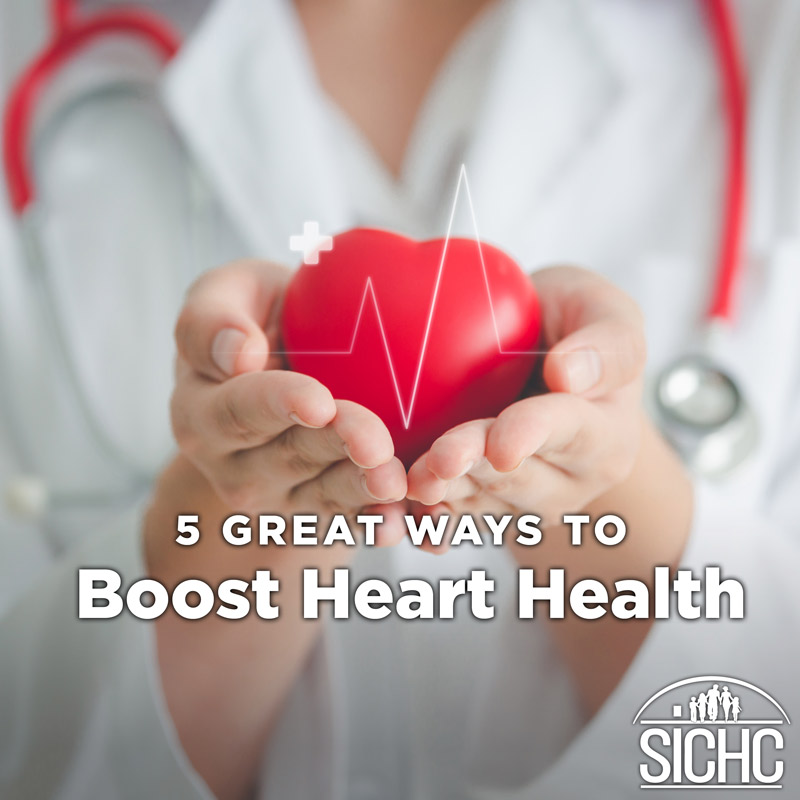Five Great Ways to Boost Heart Health

By Donna Charles, LPN, CHW and Cynthia Gillespie, CMA, CHW
Did you know that every day your heart pumps the equivalent of about 2,000 gallons of blood through your body? If you counted the times your heart beats during a 24-hour period, you might be surprised when you counted over 100,000 times!
Until we experience a problem or condition, we often don’t pay much attention to our circulatory systems. That’s one of the reasons why every time you come to a doctor’s office you often have your blood pressure and heart rate checked right off the bat – those are critical vital signs.
Taking personal charge and making good choices can boost heart health and help prevent or improve conditions.
Where’s a good place to start?
Eat fresh
Our first point is a big one: regularly include heart-healthy foods in what you eat. In southern Indiana, many people grab a bag of chips or a sweetened soft drink for a meal. On occasion that may be a treat, but over time it can cause problems. Eating a variety of fresh fruits and vegetables is a great place to boost heart health.
Sometimes we may have time constraints or wonder how we can eat fresh. Many great online resources exist that provide step-by-step instructions on how to buy and prepare fresh food that is both heart-healthy and tasty!
A suggested tip: if you shop for food at local convenience stores, try to shop in the outer aisles where you may find fresh vegetables and fruit. Boxed dried food and many canned meals (including soups) often contain high amounts of salt, which can elevate blood pressure.
The second point is related. Many of us could stand to lose a few pounds, especially when extra weight puts additional stress on our hearts and circulatory systems. Take a look at the DASH (Dietary Approaches to Stop Hypertension) diet standards for recommended grains, vegetables, fruits, lean meats and more.
Take a regular walk
Third, find the time and a way to simply get moving. Go bowling or take a walk. Try to get in 20-30 minutes of light exercise – whatever you like – a week. If you exercise regularly, your heart will appreciate it – and you’ll likely lose weight and might even sleep better – all good bonuses for good health.
Fourth, here’s a tough one, but one where there is a lot of support: stop smoking (or at least reduce how many times you smoke). And don’t give up – Mark Twain once joked: “Giving up smoking is the easiest thing in the world – I know because I’ve done it thousands of times.” Did you know that when you quit smoking, your body experiences immediate benefits – lower diabetes risks, better blood pressure, healthier hearts, and lower cancer risk? Keep trying!
Find a partner to help
Fifth, and this is especially important – find a good medical partner to help you. Your physician or provider can give you essential information that can extend and literally save your life. For example, technology now allows patients to use remote blood pressure monitors or cuffs. When they come to a doctor’s office, some people experience what is called “white coat syndrome” (based on the white cloth coats sometimes worn by doctors). When they come to the office, for whatever reason their blood pressure goes up. A remote blood pressure monitor can help your doctor or provider get a better understanding of your blood pressure over time – and provide effective treatment. A good partner will work together with you to create a plan to promote health that is right for you and then walk with you – you don’t have to go it alone.
Take charge of your health, find a good medical partner and reap the benefits of a healthy heart!
Donna Charles has served as a Licensed Practical Nurse (LPN) for 31 years and is currently the Chronic Care Manager at SICHC and a certified Community Health Worker (CHW).
Cynthia Gillespie, a Certified Medical Assistant (CMS) has served as a certified Community Health Worker (CHW) at SICHC since 2018, helping patients find resources for food, housing, health care and other needs.
